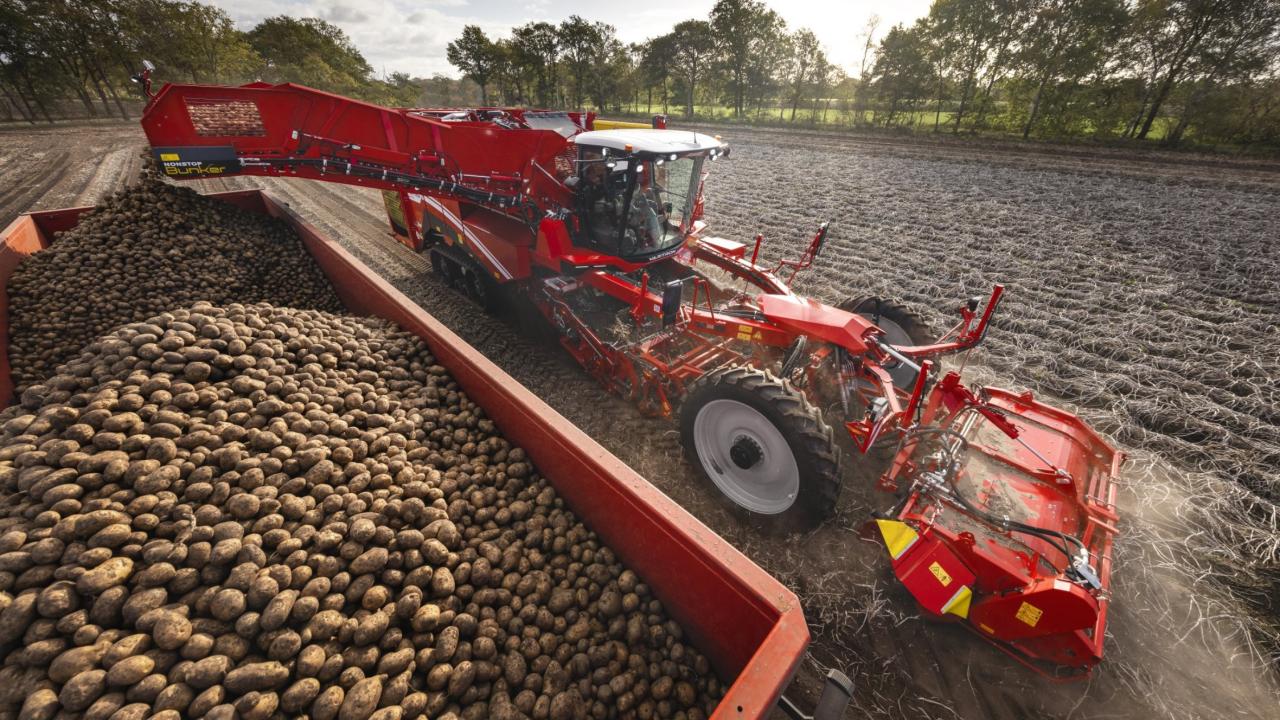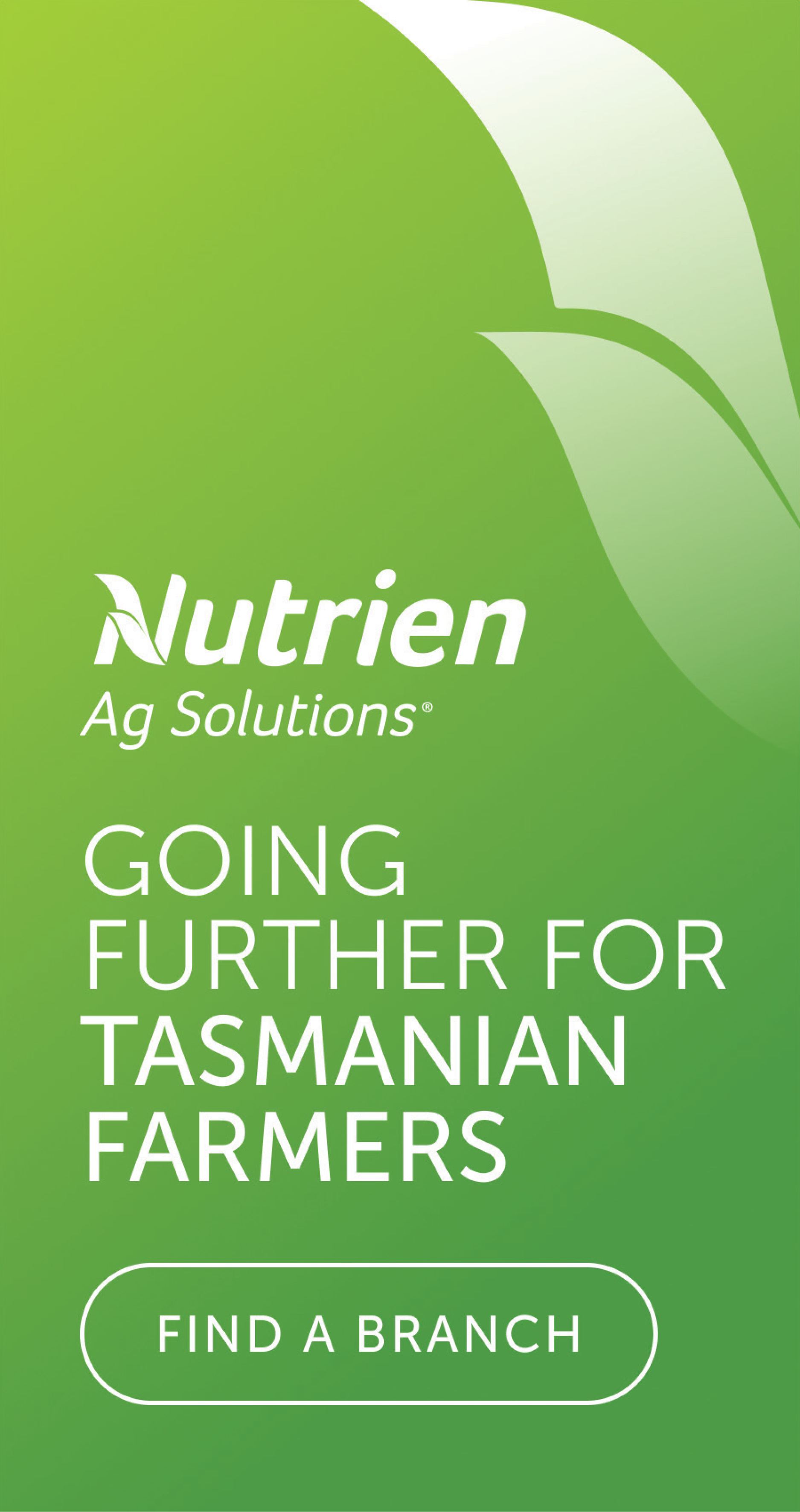Dig this new potato harvester

A new $1.2 million potato harvester has been making short work of clearing paddocks of spuds as it tracks its way through the Northern Midlands.
The new generation Grimme Varitron470 Terra Trac was recently purchased by potato contracting business DKAL, run by potato grower Angus Lyne and operations manager Dallas Kotrba.
This past week it has been on Angus’s farm Rickendon, at Campbell Town, after digging John Taylor’s crop at Winton, near Cressy.
The four-row harvester with a seven-tonne bunker capacity, high separation and rubber tracks, is a beast of a machine that is self-propelled, rather than towed behind a tractor.
Its computer can be connected to myGRIMME facilitates for the storage and retrieval of machine data and task data, and while not yet installed, it will be set up for GPS navigation and auto steering before next season.
Dallas said that some of the surprises to come out of the harvester upgrade was that it proved more manoeuvrable and faster around the paddock because of the tracks.
“A traditional harvester is clumsy by comparison – and being able to harvest without the risks associated with having people on the back is another major advantage.”
Entrusted with the impressive machine is Hugh Valpied, a 23-year-old recent graduate of Marcus Oldham College who hails from Ballarat.

During his semester break mid last year, Hugh took up a suggestion by fellow student Hugh Bradley, whose family farms at Nile and Longford, to seek work placement driving a trailing harvester for DKAL.
With only six weeks’ experience under his belt, he was offered the job of driving the new harvester after graduating.
“That was fortunate for me and it’s a great opportunity,” he said.
“The concept of digging and the paddock logistics is similar, but the operation of the new harvester is a different way of going about things and it’s been quite a learning curve,” he said.
“We’re talking a big step up in technology and while I’m hand steering at the moment, that won’t be the case next season when its automated.”
Rather than always looking back at a trailer harvester Hugh gets to keep his eyes ahead and down, remaining conscious of access by the chaser bin.
He said the main difference to traditional harvesting is that it relies on having access to a field grader to remove sub-standard potatoes, rather than stopping to sort them out during harvesting.
“I don’t have to stop at all really. To compare, the most I’ve seen achieved with two trailer harvesters in a day going flat out was 20 truckloads, and this can easily do that by itself in a day with each load holding about 27-tonnes of spuds.”
Hugh studied Farm Business Management at Marcus Oldham College in Geelong, and while he has no plans to move back to the mainland soon, he is keen to gain more hands-on experience and eventually work on his grandfather’s small potato farm in Ballarat or transfer his skills to a bigger operation.
The TerraTrac is mainly operating within a 30-kilometre radius of Campbell Town where it can be driven without too much impost on traffic, despite its 3.8m width, but it can also be transported further afield.
The potato harvest season started with some early crops in January, with most ready to dig in early March and is expected to be finished by the end of May.
Sisters Creek potato farmer and Simplot Potato Grower Committee chair Leigh Elphinstone said the harvest season has been a good one, albeit a bit dry.
“Some farms have had to irrigate the ground to prevent bruising during the digging process, and some areas that were hit with a big rainfall event in early December, around Sassafras, Bakers Beach and Latrobe area, have had some quality issues, but in my area and for the majority of growers the quality has been good.”
Simplot has sanctioned the growing of around 320,000 tonnes of potatoes to meet the state’s frozen chip, hash brown and potato gem demands, and according to Leigh supply will go close to that despite some loss to rot.
While most potato varieties being grown are Russet Burbank and Russet Rangers, Simplot has been trialling a new pink-skinned variety called Barossa, which are proving to have the quality and consistency required for chips.
Several growers at Deloraine and further up the north-west have made the effort to grow them to compare to the traditional varieties.




Add new comment